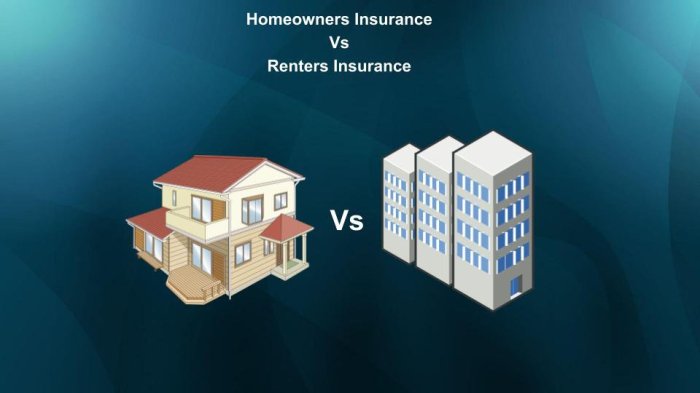With Home insurance vs renters insurance at the forefront, this comparison delves into the nuances of each policy, shedding light on the key differences and similarities to help you make an informed decision.
Whether you’re a homeowner or a renter, understanding the intricacies of insurance coverage is crucial in protecting your assets and belongings.
Home Insurance Coverage: Home Insurance Vs Renters Insurance
When it comes to home insurance coverage, there are several key elements that are typically included in a standard policy to provide protection for homeowners. One of the most important aspects of home insurance is liability coverage, which can safeguard homeowners in case someone is injured on their property.
Typical Coverage Elements of a Standard Home Insurance Policy:
- Dwelling Coverage: This protects the physical structure of the home in case of damage from covered perils such as fire, wind, or vandalism.
- Personal Property Coverage: This helps cover the cost of replacing personal belongings like furniture, clothing, and electronics if they are damaged or stolen.
- Liability Coverage: This provides financial protection in case someone is injured on the homeowner’s property and decides to sue.
- Additional Living Expenses: If the home becomes uninhabitable due to a covered event, this coverage can help pay for temporary living arrangements.
Importance of Liability Coverage in a Home Insurance Policy:
Liability coverage is crucial for homeowners as it can protect them from potentially devastating financial consequences if someone is injured on their property. This coverage can help pay for medical expenses, legal fees, and other costs associated with a liability claim.
Obtain direct knowledge about the efficiency of Cheap home insurance for new homes through case studies.
Comparison of Different Types of Home Insurance Policies:
| Policy Type | Description |
|---|---|
| HO-1 | Basic form policy that covers specific perils such as fire or theft. |
| HO-3 | Standard policy that offers broad coverage for the home and personal property. |
| HO-5 | Premium policy that provides extensive coverage for both the home and personal property. |
Renters Insurance Benefits

Renters insurance offers several benefits for tenants, providing financial protection and peace of mind in various situations. Let’s explore some of the advantages of having renters insurance and how it can be cost-effective compared to home insurance.
Protection of Personal Belongings
- Renters insurance covers the cost of replacing personal belongings in case of theft, fire, or other covered perils. This can include furniture, electronics, clothing, and more.
- In scenarios like a break-in or a fire, renters insurance can help replace or repair damaged items, saving tenants from significant financial loss.
- Having renters insurance ensures that tenants do not have to bear the full cost of replacing their belongings out of pocket.
Liability Coverage
- Renters insurance also provides liability coverage, protecting tenants in case someone is injured while visiting their rental property.
- If a guest is injured on the premises, renters insurance can help cover medical expenses and legal fees, preventing tenants from facing a lawsuit alone.
- This liability coverage can offer financial protection and legal support, giving tenants peace of mind in potential liability claims.
Cost-Effectiveness
- Renters insurance is typically more affordable than home insurance, making it a cost-effective option for tenants looking to protect their belongings and finances.
- With various coverage options available, tenants can choose a renters insurance policy that fits their budget while providing adequate protection.
- Compared to the potential expenses of replacing personal belongings or dealing with liability claims, renters insurance offers a valuable and affordable solution.
Coverage Similarities
:max_bytes(150000):strip_icc()/whats-difference-between-renters-insurance-and-homeowners-insurance-v2-2694bc76e944405aa55fe2784c373999.png?w=700)
When comparing home insurance and renters insurance policies, it’s important to note that there are some common coverage areas that apply to both types of insurance. Personal property coverage and additional living expenses coverage are two key similarities that can be found in both home and renters insurance policies.
Personal Property Coverage, Home insurance vs renters insurance
Personal property coverage in both home insurance and renters insurance protects your belongings in the event of covered perils such as theft, fire, or vandalism. This coverage helps to replace or repair personal items like furniture, electronics, clothing, and more. It’s essential to take inventory of your belongings to ensure you have adequate coverage to replace them in case of a loss.
Additional Living Expenses Coverage
In the unfortunate event that your home or rental property becomes uninhabitable due to a covered peril, both home insurance and renters insurance policies typically include additional living expenses coverage. This coverage helps pay for expenses like temporary housing, food, and other necessities while your home is being repaired or rebuilt. It provides you with the financial support needed to maintain your standard of living during a challenging time.
Coverage Differences

When comparing home insurance and renters insurance, it’s crucial to understand the key differences in coverage that each type of insurance provides. These differences can significantly impact the level of protection you receive as a homeowner or renter.
Liability Coverage
One of the major differences between home insurance and renters insurance is the amount of liability coverage included in each policy. Home insurance typically offers higher liability coverage limits compared to renters insurance. This means that as a homeowner, you may have more financial protection in case someone is injured on your property and decides to sue you for damages.
Structural Damage Coverage
Another important distinction is the coverage for structural damage. Home insurance typically covers the physical structure of the home, including the walls, roof, and foundation, in case of damage from covered perils such as fire, windstorm, or theft. On the other hand, renters insurance does not cover the physical structure of the rented property, as it is the landlord’s responsibility to insure the building itself.
In conclusion, weighing the benefits and drawbacks of home insurance versus renters insurance is essential in ensuring you have the right coverage for your living situation. Make an informed choice to safeguard your property and peace of mind.

